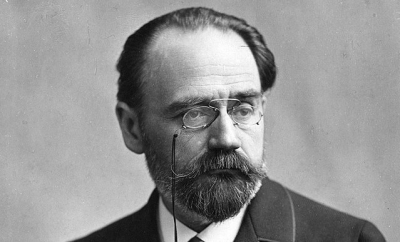Commentary
The future of the Australian picture book would appear to be in very good hands. The most recently published writers include familiar names such as authors Hazel Edwards, Margaret Wild and Gary Crew, and author–illustrators Deborah Niland and Roland Harvey. What makes the latest offerings stand out, however, is the plethora of new and emerging authors and illustrators who are venturing into this genre. Such a combination of experienced and innovative approaches can only be good for Australian children’s literature.
... (read more)Ladies and gentlemen, welcome to the brave new world of Museum Expansion Incorporated. Do you have an overstuffed museum? Is it situated, perhaps, next to an urban area in need of a makeover: some rotting docklands, say, or an abandoned flour mill? Are you privy, alternatively, to plans for a combined retail/office/residential development in need of that one extra component to give it the ultimate lift? Then buttonhole a politician eager for a good news story for a change, generate a pile of capital works grant applications, and take out some philanthropists for a really long lunch. You are now free to commission an architect or two. Either young and keen, or old and eminent, it doesn’t much matter as long as they have a creative vision expansive enough to sustain an innovative piece of ‘destination’ architecture.
... (read more)Shortly before the federal elections of October 2004, Treasurer Peter Costello delivered an address entitled ‘The Moral Decay of Australia’ to 16,000 members of the Assemblies of God at the Sydney Hillsong Church. For his main theme, Costello invoked ‘the Judeo-Christian-Western tradition’, the core of which, according to him, was the Ten Commandments. He lamented that few people could recite the Commandments today, despite the fact that ‘they are the foundation of our law and our society’. He listed the legacy of that tradition as the rule of law, respect for life, respect for others and private property rights. ‘Tolerance under the law,’ he added, is also, ‘a great part of this tradition.’
... (read more)On Saturday, 3 December 2005, the day after Nguyen Tuong Van was hanged in Singapore, David Marr contributed a major article, ‘Death of compassion’, to the Sydney Morning Herald’s News Review section. A year earlier, Marr had made a welcome return to the SMH following his spell as host of Media Watch. He is always worth reading: informed by broad interests in the arts, politics and religion, an ongoing commitment to investigative journalism following his years at the National Times, and sometimes by moral outrage, Marr’s writings are some of the most elegant and insightful to grace Australia’s daily press.
This particular Saturday, I finished reading his piece feeling curiously frustrated. Marr explored public reaction to the execution, from the deliberately low-key strategy of the convicted drug runner’s legal team and supporters to the public campaign they ran to save him following his failed appeal for clemency. The article was based on a central premise: ‘roughly half the nation was happy to see him [Nguyen] swing.’ The evidence for this claim? ‘Talkback.’
... (read more)Though we have seen periods during which Australian cinema has been synonymous with period-set narratives and idealised evocations of the outback, there has always been a darker side to our cinematic imagination, a gritty, hard-edged element that is just as crucial to this country’s feature film output as are the sepia-tinged dreamscapes. Many of the pivotal films of the Australian New Wave brought a vivid, finely judged aesthetic to the bleakest of subject matter. Fred Schepisi’s The Chant of Jimmie Blacksmith (1978) conjured a harrowing tragedy of grisly murders and manhunts, while Peter Weir’s darkly comic feature début, The Cars That Ate Paris (1974), presented a paranoid, murderous rural community whose raison d’être was maintaining its seclusion, even if that meant killing any outsiders who found their way into town.
... (read more)Within a week of the recent release of Harry Potter and the Half Blood Prince, millions of children and adults around the world had read it. Now comes the long wait for the final tome in this cleverly designed series by the prolific J.K. Rowling. Nil desperandum. The fantasy novel for children – and especially crossover books which, like the Harry Potter series, appeal to both adults and children – has a long tradition, and there are a myriad other fantastic books to turn to, many of which have been written by Australian authors.
... (read more)An Indian fast-food outlet has named itself after Mahatma Gandhi and features a caricature of his face in neon lights. Tacky? Certainly. Only in America? Only in Australia, actually, or at least that’s what a major cable television channel would like to suggest.
... (read more)At first, you find the claim that you resemble your parents implausible. Later, you find it unflattering. But there are moments when you glimpse someone in a mirror and only belatedly recognise yourself. These are the moments when you realise – it is in equal parts chastening and reassuring – that if you are moving through time as an image of your parents’ past, their image is waiting for you in mirrors: they are the ghosts that haunt your future, as it were.
... (read more)Unlike Flaubert, the ‘hermit of Croisset’, who turned away from his age in an attitude of ironic detachment, Émile Zola (1840–1902) embraced his century in a way no French writer had done since Balzac. Zola’s ambition was to emulate Balzac by writing a comprehensive history of contemporary society. Through the fortunes of his Rougon-Macquart family, he examined methodically the social, sexual, and moral landscape of the late nineteenth century along with its political, financial, and artistic contexts. Zola is the quintessential novelist of modernity, understood in terms of an overwhelming sense of tumultuous change.
... (read more)In the teaching of copyright, it is usually said that copyright is an economic right. In Arnhem Land, they think otherwise. In 1990, I attended a meeting of Aboriginal artists in Maningrida. These artists had been involved in a copyright infringement case concerning the unauthorised reproduction of works of art on T-shirts. The case had settled, and the purpose of the meeting was to discuss the division of the spoils. The case involved a number of artists and different infringements by the same infringer.
... (read more)




